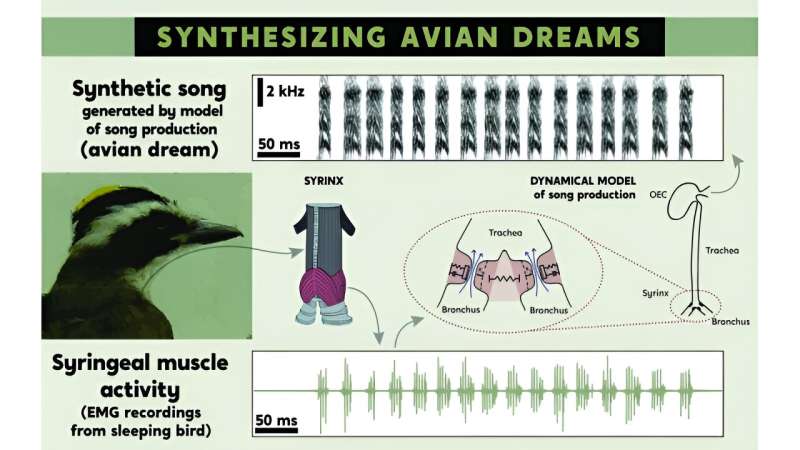
Vocal muscle activity of birds during sleep can be translated into synthetic songs. Credit: Romina Kuppe and Ana Amador
It’s Saturday, which means that in a universe where the arrow of time moves backward, people have to go to work tomorrow. In such a hypothetical universe, Garfield hates Fridays—tough to imagine. This week, we looked at several hundred breaking science developments, four of which I’ve highlighted here, including a new geoengineering study, a quantum infosec breakthrough, and listening in on the melodious dreams of birds.
Clouds infrigidate
During the solar eclipse on Monday, as the light across Brooklyn grew dimmer and the temperature dropped a noticeable eight degrees, it occurred to me: Blocking the sun is a great way to cool the atmosphere (I have an associate’s degree from an accredited junior college). As it turns out, researchers have for decades been considering geoengineering approaches with interest (and often sheer terror).
Now, researchers at the University of Birmingham modeling marine cloud brightening have determined that it works mostly by increasing the amount of cloud cover, accounting for up to 90% of its cooling effect. Previous models focused mostly on the effect of aerosol injection to increase cloud brightness and reflect sunlight right the hell back where it came from. The idea is to spray tiny, reflective particles into the atmosphere, which mix with clouds and increase their brightness; experiments are underway in Australia as oceanic researchers seek to reduce bleaching of the Great Barrier Reef.
In the current study, the researchers studied natural aerosol injection from the eruption of Kilauea in Hawai’i using machine learning models, satellite data and historical meteorological data. During periods of volcanic activity, they estimate that cloud cover increased up to 50% and produced a cooling effect of up to -10 W m-2 regionally.
Figment actualized
Researchers from the University of Buenos Aires leveraged their 20 years of research into avian muscular activation to transform neural data of an unconscious bird dreaming about a territorial confrontation into synthetic birdsong. While sleeping, birds exhibit activity patterns in their muscles that correspond to known behaviors, including signals to musculature related to vocalization.
Similarly, humans and other animals exhibit muscle activations during dreams that are analogous to waking activities. The bird, a flycatcher called a great kiskadee (named for its signature song), was chosen for its well-studied physical singing mechanisms. While the bird slept, the researchers observed that it raised its crest of feathers in a gesture associated with territorial behavior; using a dynamical model of the suboscine vocal apparatus, the researchers transformed data derived from the bird’s syringeal muscle activity into the distinctive territorial call of the great kiskadee.
“I felt great empathy imagining that solitary bird recreating a territorial dispute in its dream. We have more in common with other species than we usually recognize,” says study author Gabriel Mindlin.
Snooker imaginary
Researchers have long used an idealized game of billiards as a model for mathematics and physics phenomena. Assuming a perfect billiards table and a perfectly spherical cue ball with zero friction, for example, the ball will ricochet forever off the table’s walls.
Questions that theoreticians explore include things like, “Does the ball ever return to its starting point?” “Does the ball ever visit every point on the table?” And what happens if you vary its starting point or the angle of the initial shot?
These questions are applicable in many math contexts, including explorations of chaos. Now, a group of researchers at the University of Amsterdam have modified this thought experiment with a new constraint: What if the ball was restricted from ever crossing its own path? The result is that the size of the table becomes increasingly small. The new constraint reveals that the ball eventually becomes trapped on the table by its own path, and that it is more likely to become trapped in some parts of the table than others.
This is interesting for biologists, because many species track their own paths while searching for food—for example, to avoid previously explored areas. The researchers point out that single-cell slime molds use such self-avoiding paths. “The results would help us to better understand these biological systems, and perhaps even incorporate the lessons we learn to optimize this form of billiards with memory for use in robots,” says co-author Mazi Jalaal.
Quanta ensorcelled
Physicists at Oxford University know that you don’t currently have a quantum computer in your home, but if you did, they think you’d probably want to upload photos and whatnot to the cloud. I mean, there are some daunting challenges ahead for quantum computing, like finding a qubit that stays coherent at temperatures above absolute zero, just for starters. But hypothetically, if they did, and it was possible to mass-produce home appliances with quantum computing hardware, you would want your cloud connection to be secure.
The researchers describe “blind quantum computing,” an advance in secure quantum networking using trapped ions and single photons. In the lab, they connected a quantum computing server with a photon detector via a fiber network link. With their system, it’s possible to access remote quantum systems, process confidential information using secret algorithms, and verify that the results are correct without revealing secret information.
Computations incur corrections that must be applied to all following computations, requiring real-time information to comply with the algorithm. They envision a device that would plug into a laptop to protect data while using quantum cloud services.
© 2024 Science X Network
Citation:
Saturday Citations: Listening to bird dreams, securing qubits, imagining impossible billiards (2024, April 13)
retrieved 13 April 2024
from https://phys.org/news/2024-04-saturday-citations-bird-qubits-impossible.html
This document is subject to copyright. Apart from any fair dealing for the purpose of private study or research, no
part may be reproduced without the written permission. The content is provided for information purposes only.
>>> Read full article>>>
Copyright for syndicated content belongs to the linked Source : Phys.org – https://phys.org/news/2024-04-saturday-citations-bird-qubits-impossible.html
